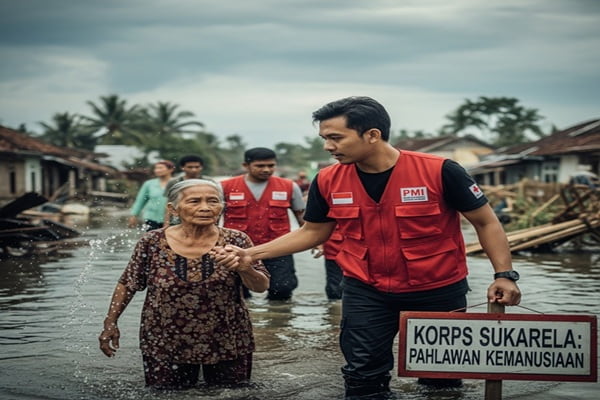In Indonesia, where natural disasters and public health challenges are all too common, a group of dedicated volunteers quietly makes a huge difference every day. This group is the Korps Sukarela (KSR)—literally the “Volunteer Corps”—part of the Palang Merah Indonesia (PMI), the Indonesian Red Cross. From disaster relief to blood donation campaigns, first aid, and community outreach, KSR volunteers are the backbone of humanitarian work in the country.
Let’s take a deep dive into what makes KSR so vital, how it works, and why it’s a perfect example of civic duty and altruism in action.
History and Evolution of Korps Sukarela
The roots of Korps Sukarela trace back to the years following Indonesia’s independence, a time when national unity and humanitarian efforts were essential. PMI realized early on that trained volunteers were needed to handle emergencies effectively. From that vision, KSR units began forming in universities, local PMI chapters, and community groups.
Initially informal, KSR quickly grew into a nationally recognized volunteer force. Today, it’s a structured organization with regional, municipal, and institutional chapters, actively participating in disaster response, public health campaigns, and social initiatives.
How to Become a Member of Korps Sukarela
Joining KSR is open to anyone with a passion for helping others. Here’s the typical path:
-
Age Requirement: 18 years or older
-
Education: Minimum of junior high school graduate
-
Health: Physically and mentally fit
-
Training: Complete at least 76 hours of basic volunteer training
-
Commitment: Willing to serve voluntarily in disasters and social programs
Most volunteers join through university-based KSR units or local PMI recruitment drives. Training covers first aid, evacuation procedures, logistics, and psychosocial support, with advanced courses for those looking to specialize in areas like emergency medical services or disaster mitigation.
Core Roles and Responsibilities of Korps Sukarela
KSR volunteers wear many hats, balancing emergency response with long-term community service. Some key responsibilities include:
Disaster Response
Indonesia faces earthquakes, floods, tsunamis, and volcanic eruptions. KSR volunteers are often first on the scene, helping with:
-
Evacuating affected communities
-
Setting up temporary shelters
-
Administering first aid and emergency medical care
-
Assisting with logistics and aid distribution
Blood Donation Campaigns
KSR units are active in coordinating blood drives, managing donor registration, and educating communities about the importance of regular blood donation.
Community Health Initiatives
Volunteers regularly engage in programs such as:
-
Free medical check-ups
-
Vaccination campaigns (including COVID-19)
-
Public hygiene and sanitation initiatives
-
Mental health workshops
-
Health education in schools and neighborhoods
Youth Engagement and Peer Education
At many universities, KSR members train high school students on topics like:
-
HIV/AIDS awareness
-
Drug abuse prevention
-
Conflict resolution
-
Environmental conservation
The Organizational Structure of Korps Sukarela
KSR operates under a structured hierarchy supervised by local PMI branches:
-
Commandant/Coordinator: Leads the unit
-
Training & Development Officers: Ensure members are well-prepared
-
Logistics & Operations Teams: Manage resources and deployment
-
Public Relations & Outreach Division: Handles community engagement
Regular meetings, simulation exercises, and refresher courses keep members ready and proficient at all times.
Korps Sukarela at Universities: A Youth-Driven Force
One of KSR’s greatest strengths is its university-based units. Known as UKM KSR PMI (Student Activity Units of Korps Sukarela), these chapters train students to respond to emergencies, participate in humanitarian missions, and lead awareness campaigns on campus.
The energy and idealism of student volunteers make these units highly active and innovative. Many KSR alumni go on to become healthcare professionals, community leaders, and policy advocates, proving the program’s long-term impact.
The Impact of Korps Sukarela on Indonesian Society
KSR’s contributions go far beyond simple volunteer statistics. Here’s a glimpse of their influence:
-
Tens of thousands of active volunteers nationwide
-
Hundreds of disaster responses every year
-
Millions of people impacted through health and social programs
-
Thousands of university students trained annually in emergency response and community service
Their work, often behind the scenes, saves lives, strengthens communities, and spreads hope.
Challenges Faced by Korps Sukarela Volunteers
Volunteering with KSR is rewarding, but not without obstacles:
-
Physical Risks: Responding to disasters can be dangerous
-
Emotional Toll: Exposure to trauma impacts mental health
-
Resource Limitations: Volunteers often work with minimal equipment
-
Recognition Gap: Contributions may go unnoticed
-
Time Management: Balancing volunteering with personal or academic life
Despite these challenges, KSR members remain committed because of their dedication to helping others and serving the nation.
Success Stories of Korps Sukarela
Many KSR alumni have become leaders in healthcare, disaster management, and community development. Some have received national recognition, while others have joined international organizations such as Doctors Without Borders, the Red Cross, or the United Nations.
A standout example is the Yogyakarta KSR unit, which played a pivotal role during the 2010 Mount Merapi eruption, evacuating villagers and setting up emergency shelters within hours.
Also Read : Isac Hallberg: The Quiet Life of a Celebrity Child
How to Support or Collaborate with Korps Sukarela
Even if you’re not a volunteer, you can help KSR in meaningful ways:
-
Donate to PMI’s disaster relief fund
-
Offer logistical support during emergencies
-
Collaborate on community service projects
-
Share your expertise as a guest trainer
-
Promote KSR’s campaigns on social media
Universities, companies, and NGOs often partner with KSR for CSR initiatives, training programs, and awareness campaigns.
Conclusion: Korps Sukarela is the Heartbeat of Indonesian Humanitarianism
In a country as diverse and disaster-prone as Indonesia, Korps Sukarela embodies compassion, resilience, and civic responsibility. These volunteers are unpaid, selfless, and often unseen, yet they show up rain or shine, calm or crisis, to protect, educate, and uplift communities.
KSR volunteers are more than just helpers—they are the soul of Indonesian humanitarianism. Supporting and recognizing their efforts ensures that Indonesia remains prepared, resilient, and united, no matter what challenges come its way.

